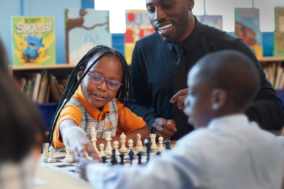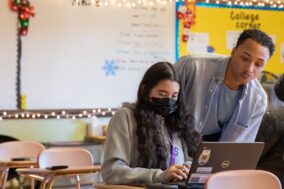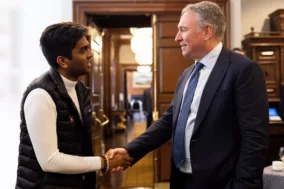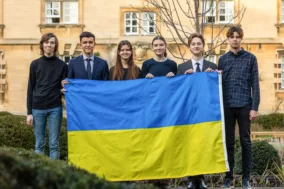Expanding Access to High-Quality Education
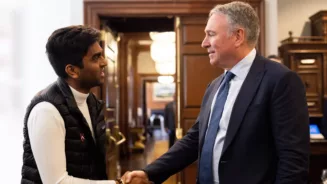
- Ken Griffin’s longstanding commitment to expanding student access and opportunity in education has manifested itself in many ways, including historic gifts to some of the nation’s leading academic institutions.
- Griffin's gifts totaling more than half a billion dollars to Harvard University have helped expand access to the renowned institution for students and scholars of all backgrounds and economic circumstances. With Griffin's leadership on the issue of need-blind admissions, Harvard has continued to inspire other universities to bolster their own commitments to financial aid.
- Griffin’s $125 million gift to the Economics Department at the University of Chicago—the second-largest gift in the university’s history—supported the expansion of the department, a new research incubator, and expanded financial aid for students in the program, which has long been regarded as one of the best and most influential economic departments in the world.
It is so important to our society that every single young man and woman in our country has access to our best schools, and our best schools have the ability to fund the research that will keep America competitive in the global landscape.
Michael Bocker, Harvard College class of 2022, was the second of seven children growing up in a small house in the Chicago suburbs. “We had hardly any resources, so it was very difficult for us,” he recalls. “I was quite surprised when my acceptance to Harvard came. I couldn’t pay for college. There was no way my parents could ever afford that. The only way I was ever going to be able to go to college was through financial aid.”
That financial aid came in the form of a scholarship from someone who, decades before, had the good fortune to attend Harvard College himself. As a student, Ken Griffin advanced his education as an economics concentrator and, from his third-floor dorm room in Cabot House, began to lay the groundwork for what would eventually become the world’s most profitable hedge fund.
Griffin’s time at Harvard strengthened his conviction that making a world-class education available to the best and brightest students—regardless of background—is essential to preserving and expanding America’s economic and technological leadership in the world.
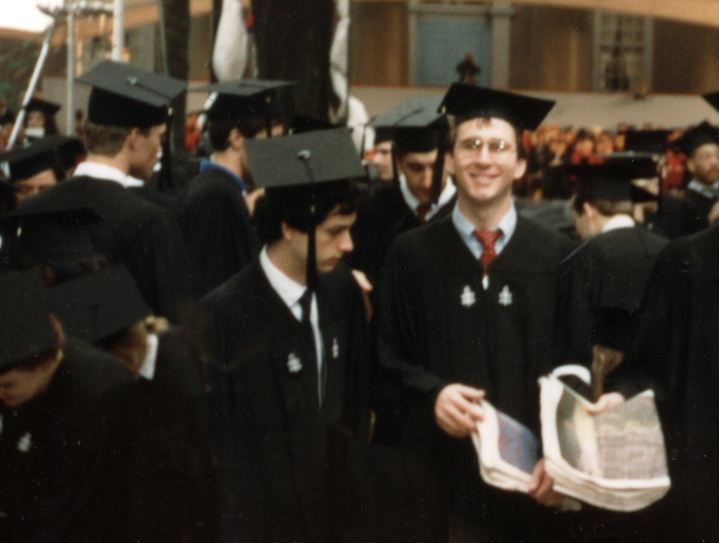
Over the past decade, Griffin has made game-changing gifts to American universities to support access and opportunity for scholars and to advance groundbreaking research.
In 2014, as “an investment in the next generation of leaders as we continue to break down barriers to an outstanding education,” Griffin made the largest gift to Harvard College in the school’s nearly four-century-long history. The gift focused on supporting financial aid, and in recognition of his commitment to the program, Harvard renamed its financial aid program the Griffin Financial Aid Office.
I think Harvard provides the opportunities to be able to look ahead and really dream and imagine a larger possibility of who I can be and what I can do in the future.
The gift has supported more than 600 undergraduates to date. At its core is the creation of the Griffin Scholars program, which supports more than 225 students each year. Even further, Griffin helped lead fundraising efforts designed to inspire fellow alumni and friends of the college to contribute to the school’s substantial aid program. Taken together, the aid covers the full tuition, room and board and incidental expenses for more than one in five Harvard College students.
225+
Griffin Scholars supported annually, making a Harvard education more accessible to talented students around the world
57
Countries represented by Griffin Scholars at Harvard
Ken’s astounding philanthropic leadership … will help us sustain our revolutionary financial aid program and ensure that once a student is admitted to Harvard College, cost of attendance is never a barrier. It will impact the lives of families, now and for generations to come.
By 2017, the first of the Harvard Griffin Scholars graduated, and in 2020 the school produced a study of the first four years of the graduates’ experience during and after college—a remarkable portrait of personal and professional success.
Griffin Scholars came to Harvard, the study revealed, from nearly every state in the union, 57 countries, and six continents around the world. A third of them identified as first-generation college students, and most said that financial aid had been a deciding factor in their ability to pursue a Harvard education.
Over half went into the workforce immediately upon graduating, while about a quarter enrolled in graduate and professional schools. Those entering the business world included planners and strategists at Twilio and Slack in San Francisco and Kraft Heinz in Chicago; financial analysts at Morgan Stanley in New York; and software engineers at Google in New York and Facebook in Menlo Park.
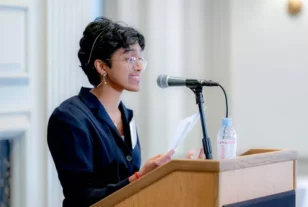
Those who pursued post-graduate programs included law students at Notre Dame, Georgetown, and the University of California, Berkeley; business students at Harvard and Stanford; medical students at Harvard and Brown; future physicists at Columbia; historians at Princeton; and public policy experts at Oxford.
Some scholars went into public service or the arts. One became a writer and editor of an online sustainability journal in Istanbul, another the founder of an education consultancy in Johannesburg, a third a charter-school teaching fellow in the South Bronx. Another scholar became an actress, with credits in a major film and television series.
Beyond these striking markers of achievement, the impact of the Griffin Scholars program is perhaps felt most profoundly—as it will be for decades to come—in the personal sense of transformation students have experienced.
Hayeon Rachel Ok, a Griffin Scholar in Harvard’s class of 2025, emigrated to the United States with her family from Korea at the age of three. Settling in Flushing, Queens, her family—none of whom spoke English—sent Rachel to local schools, spent their weekends at museums, and, as she puts it, “sought to learn the culture of America and New York City along the way.” Rachel applied to Harvard, even though “we all found an Ivy League school to be really out of our reach, just from our immigrant status and also because we didn’t really know anyone who had gone to an Ivy League school before.”
Thanks to her scholarship, Rachel is now concentrating in economics at Harvard, and she sees herself entering the field of finance upon graduation.
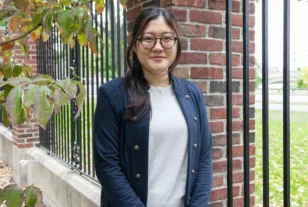
The Harvard Faculty of Arts and Sciences
In the spring of 2023, eight years after announcing Griffin’s historic support for financial aid at Harvard College, the University revealed that Griffin had made another significant gift—this time to advance cutting-edge research and expand access and excellence in education for students and scholars, through support for the Faculty of Arts and Sciences (FAS). FAS, the historic heart of Harvard and home to its undergraduate program and the Harvard Kenneth C. Griffin Graduate School of Arts and Sciences, which houses all Harvard Ph.D. programs, will continue to cultivate an academic community unsurpassed in its excellence and impact across the entire range of liberal arts and science disciplines.
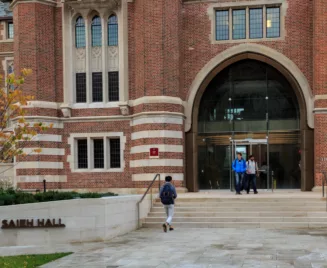
The Kenneth C. Griffin Department of Economics at the University of Chicago
Meanwhile, a transformative partnership with another great American institution of higher learning is helping to develop future leaders in the field of economics. In February 2017, Griffin Catalyst donated $125 million to the University of Chicago Department of Economics—the second-largest gift in the university’s history.
The gift funded the expansion of the economics program, the creation of a new research incubator, and, as at Harvard, a dramatic increase in financial aid for students entering into the university’s culture of open discourse, free expression, and intellectual pursuit. In recognition of the scale and import of the gift, the department was renamed the Kenneth C. Griffin Economics Department.
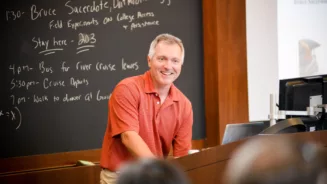
I'm focused on areas of research that are going to keep America competitive, whether it's in the hard sciences, basic research, or understanding economics—and in particular the fields of behavioral economics, experimentation, and understanding how people make decisions and allocate scarce resources.
For Griffin, the gift was an opportunity not only to increase student access to higher education, but also to strengthen an internationally recognized program critical to the intellectual strength and standing of the United States itself.
With a world-renowned faculty, including the legendary economist Milton Friedman, that has been awarded fourteen Nobel Memorial Prizes in Economic Sciences—more than any other university—and six John Bates Clark Medals, the program is an academic powerhouse.
“It’s a chance to support the pre-eminent department of economics in the world,” Griffin observed. “We want strong financial aid packages … to attract the best graduate students and the best professors to the university, and in particular, to the Economics Department.”
